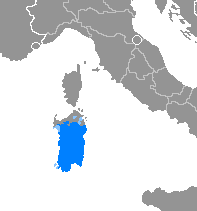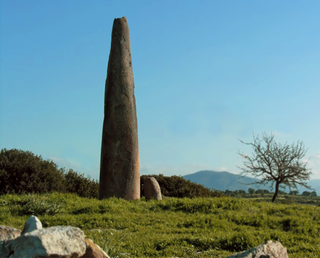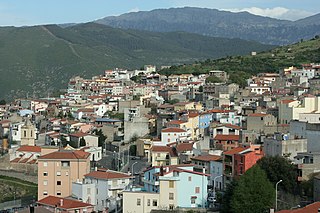Biography
Corbeddu went into hiding in 1880 after being accused (perhaps falsely) of rustling. [1]
After a long series of crimes (among others the attack of the diligence Nuoro-Macomer), he took refuge in a cave in the Supramonte of Oliena (the cave is now named for him Corbeddu Cave ).

Nuoro is a city and comune (municipality) in central-eastern Sardinia, Italy, situated on the slopes of the Monte Ortobene. It is the capital of the province of Nuoro. With a population of 36,347 (2011), it is the sixth-largest city in Sardinia.

Macomer is a town and comune of Sardinia (Italy) in the province of Nuoro. It is situated on the southern ascent to the central plateau of this part of Sardinia, at the junction of narrow-gauge lines branching from the main railroad line running east to Nuoro and west to Bosa.

The Supramonte is a mountain range located in central-eastern Sardinia, Italy. It lies northeast of the Gennargentu massif, traveling eastwards until it reaches the Tyrrhenian Sea at the Gulf of Orosei. It has an area of about 35,000 hectares, encompassing most of the territories of the comuni (municipalities) of Baunei, Dorgali, Oliena, Orgosolo and Urzulei. The populated areas of these comuni lie at the borders of the Supramonte, which, for the most part, is a largely uninhabited area of sharp limestone cliffs and deep, lush canyons.
In that place, abandoning any criminal activity, he began to play the role of peacemaker and arbitrator in disputes and was reputedly possessed of wisdom.
In 1894 Corbeddu collaborated with the authorities as a mediator for the release of two French timber merchants, Louis Paty and Regis Proll, who had been kidnapped in the territory between Seulo and Aritzo. He refused the monetary reward. [2]

Seulo is a comune (municipality) in the Province of South Sardinia in the Italian region Sardinia, located about 70 kilometres (43 mi) north of Cagliari. As of 31 December 2004, it had a population of 970 and an area of 58.8 square kilometres (22.7 sq mi).

Aritzo is a comune (municipality) in the Province of Nuoro in the Italian region Sardinia, located about 80 kilometres (50 mi) north of Cagliari and about 40 kilometres (25 mi) southwest of Nuoro.
Then, he was given ten days leave so that he could return to Oliena and walk round the village unhindered. [3]
In 1898 he was surrounded by the carabinieri on the mountains of Orgosolo together with another fugitive, Antonio Congiu, and a shepherd boy of fifteen years. While trying to escape encirclement he was shot and killed by the sharpshooter Aventino Moretti with a shot in the back.
With him, the fifteen-year-old shepherd was killed while Congiu escaped. [4]
The absconding of Corbeddu lasted eighteen years.

Grazia Maria Cosima Damiana Deledda was an Italian writer who received the Nobel Prize for Literature in 1926 "for her idealistically inspired writings which with plastic clarity picture the life on her native island [i.e. Sardinia] and with depth and sympathy deal with human problems in general". She was the first Italian woman to receive the prize.

Sardinian or Sard is a Romance language spoken by the Sardinians on most of the island of Sardinia. Many Romance linguists consider it the closest genealogical descendant to Latin. However, it also incorporates a Pre-Latin substratum, as well as a Byzantine Greek, Catalan, Spanish and Italian superstratum due to the political history of the island, which became a Byzantine possession followed by a significant period of self-rule, fell into the Iberian sphere of influence in the late Middle Ages, and eventually into the Italian one in the 18th century.

Archaeological evidence of prehistoric human settlement on the island of Sardinia is present in the form of nuraghes and others prehistoric monuments, which dot the land. The recorded history of Sardinia begins with its contacts with the various people who sought to dominate western Mediterranean trade in Classical Antiquity: Phoenicians, Punics and Romans. Initially under the political and economic alliance with the Phoenician cities, it was partly conquered by Carthage in the late 6th century BC and then entirely by Rome after the First Punic War. The island was included for centuries in the Roman province of Sardinia and Corsica, which would be incorporated into the diocese of Italia suburbicaria in 3rd and 4th centuries.

The Judicates ; in English also referred to as Sardinian Kingdoms, Sardinian Judgedoms or Judicatures, were independent states that took power in Sardinia in the Middle Ages, between the ninth and fifteenth centuries. They were sovereign states with summa potestas, each with a ruler called judge, with the powers of a king.
Maria Carta was an Italian folk music singer-songwriter. She also performed in film and theatre and, in 1975, she wrote a book of poetry, Canto rituale . Throughout her 25-year career, she covered the richly diverse genres of traditional music of her native Sardinia, often updating them with a modern and personal touch. She succeeded in bringing Sardinian folk music into wider popular awareness, in demonstrations at a national level in Italy as well as internationally.
The Banda della Magliana is an Italian criminal organization based in Rome founded in 1975. Given by the media, the name refers to the original neighborhood, the Magliana, of some of its members.

Louis Alphonse van Gasteren was a Dutch film director, film producer, and artist. He was born in Amsterdam. He is the son of actor Louis van Gasteren Sr. and singer Elise Menagé Challa, and the brother of actress Josephine van Gasteren.

Piero Calamandrei was an Italian author, jurist, soldier, university professor and politician. He was one of Italy's leading authorities on the law of civil procedure.

The Kingdom of Sardinia was a state in Southern Europe from the early 14th until the mid-19th century.

New Basket Brindisi, for sponsorship reasons named Happy Casa Brindisi or shortly Brindisi, is a professional Italian basketball based in Brindisi, Apulia. It plays in the first division LBA as of the 2019–20 season.
Sardinia is the second largest island in the Mediterranean Sea and an autonomous region of Italy. Tourism in Sardinia is one of the fastest growing sectors of the regional economy. The island attracts more than a million tourists from both Italy, from the rest of Europe, and, to a lesser degree, from the rest of the world. According to statistics, tourist arrivals in 2016 were 2.9 million people.

Sardinian nationalism or also Sardism is a social, cultural and political movement in Sardinia calling for national devolution, further autonomy, or even outright independence, from Italy. It also promotes the protection of the island's environment and the preservation of the Sardinian cultural heritage.
Marquis of Villahermosa e Santa Croce is a title first granted in 1745 by Charles Emmanuel III, king of Sardinia to the Sardinian merchant Bernardino Antonio Genovès. It has passed afterwards to a branch of the house Manca, called Manca di Villahermosa since.
Sardinian banditry was a criminal phenomenon typical of Sardinia.

The Pre-Nuragic period refers to the prehistory of Sardinia from the Paleolithic till the middle Bronze age, when the Nuragic civilization flourished on the island.

Enzo Forcella was an Italian essayist, historian and journalist.
Nino Valeri was an Italian historian.
This page is based on this
Wikipedia article Text is available under the
CC BY-SA 4.0 license; additional terms may apply.
Images, videos and audio are available under their respective licenses.



















